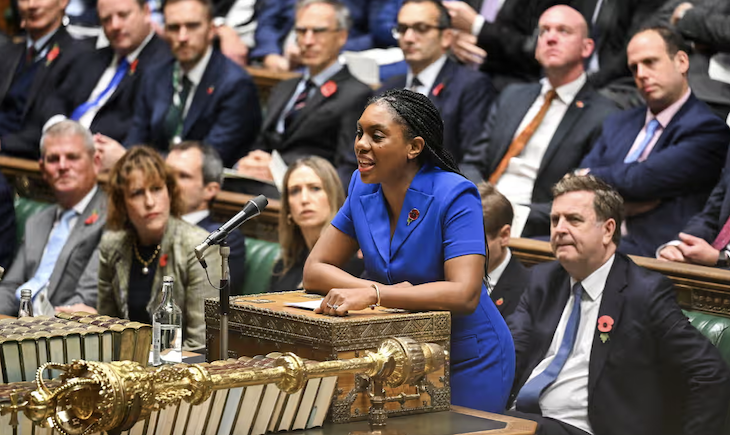A consensus seems to be forming, with unreasonable speed, that Kemi Badenoch isn’t exactly smashing it at Prime Minister’s Questions. Much of the harsher criticism comes from expected quarters – ‘Tory Gloom as Gaffe-Prone Kemi Badenoch Endures Another Miserable PMQs’ says a headline in the Huffington Post, while John Crace snarks in the Guardian that ‘Kemi Badenoch is turning out to be the gift that keeps on giving… to the Labour party.’ On the James O’Brien show there was a ‘more-in-pity-than-contempt’ snigger-fest between the host and political editor Natasha Clark: ‘Are we flirting with the possibility that she actually did better last week?’ the host chortled gleefully.
Such pundits, of course, were never going to be generous to Badenoch as leader, whatever she did. Yet even in The Spectator, there’s a less than rapturous response, with Lloyd Evans slamming the new Tory leader two consecutive Wednesdays as appearing, in her clashes with Keir Starmer, ‘snippy’, ‘childish’ and all ‘at sea’.
So what happened, to draw such a withering response? Those who watch yesterday’s PMQs expecting carnage may find themselves disappointed. True, Kemi clearly hasn’t hit her stride yet, fluffing her lines at one point, falling into the odd trap and not yet seeming to have developed a nimble response to Starmer’s comebacks, which occasionally floor her. There’s also, undeniably, a scattergun quality to her questions, ‘a string of topics’ rather than a focussed assault, which Natasha Clark picked up on: ‘She went on climate change, then the budget, then council-tax funding and then the 4-day week.’ Wiser to do more with less, Clark suggested, because otherwise ‘I don’t think you really get enough time to skewer the Prime Minister on any of these things.’
At one moment, too, Kemi exposes herself to Starmer’s pantomime-ish scorn by asking a question to which he has, he drones to much mirth, already given the answer: ‘It’s a bit of a fundamental failure of the leader of the opposition!’
Yet anyone assuming it was Badenoch who came worst out of these exchanges, or that Starmer’s approach will play well with the electorate, should perhaps read journalist Madeline Grant’s response to yesterday’s proceedings:
Every woman will know the feeling of blood slowly beginning to boil as some patronising twerp gets on his high horse and begins what he believes to be an edifying lecture… I’m sure Sir Keir thinks of himself as an equal opportunity patroniser… but in reality, his particular issue with women – identified by his own former MP Rosie Duffield – really comes out in moments like this… He’s slowly metamorphosing into Michael Winner: plump, patronising, proffering a rage-inducing “calm down, dear”.
In any case, these are early days and the position of new Opposition Leader, whoever you are, is hardly a cushy one. Millions of eyes, many of them hostile (not least from members of your own side) are watching and forming instant judgements on you. The stomach butterflies at how you will perform, the unaccustomed choppiness with which things move, the fact that, as Winston Churchill is said to have remarked, there’s no difference in politics greater than being not-leader and leader: all these things conspire to prevent that state of relaxation necessary to perform at your best.
Certainly, Badenoch has yet to pinpoint Starmer, as Blair did in his first outing with John Major (‘Wouldn’t he agree that a divided government is a weak government, and a weak government is no good for Britain?’) or David Cameron with Blair himself: ‘This approach is stuck in the past, and I want to talk about the future. He was the future once.’
In Parliament, the Iron Lady seemed stiff and over-rehearsed
Yet both these men became Opposition Leader in luckier circumstances – Blair when the Major government, squeaking through the election with a 21-seat majority and tearing itself up over Europe, had already been through the financial meltdown of ‘Black Wednesday’; Cameron when, following the monumental balls-up of the Iraq war, divisions in Blair’s party were visibly yawning open and many on his own side were calling for his exit.
Starmer, looking about himself stagily with his putdowns – ‘Isn’t she clueless?’ he seems to say – can play to a gallery of over 400 Labour MPs, knowing they will simper back at him. Kemi, with her 120 fellow conservatives, can scarcely do the same. It requires more time, and for this Labour government to achieve new depths of unpopularity, for any Tory leader to feel that helpful prevailing wind in which the harshest of blows can be struck.
Besides, there’s a clear historical precedent for Badenoch’s early PMQ woes. Margaret Thatcher, becoming Opposition Leader in 1975, was also quickly deemed a dud at the despatch box. ‘Studying her parliamentary performances in her first year as leader,’ writes Charles Moore in his biography, ‘one cannot find any occasion on which she won control of the House….She lacked, at this stage, the confident spontaneity required.’ In Parliament, the Iron Lady seemed stiff and over-rehearsed: ‘Time and again,’ writes Jonathan Aitken, ‘her troops left the chamber after PMQs feeling deflated.’ ‘Hasn’t quite got the pitch of the wicket yet, has she?’ said Cranley Onslow, later Chairman of the 1922 Committee.
‘We couldn’t believe our luck,’ recalled Harold Wilson aide Bernard Donoughue. ‘She couldn’t lay a glove on him…She just kept reading out prepared questions, which weren’t holding the house.’ At PMQs, Donoughue said, Thatcher seemed ‘petrified…like a rabbit in front of a stoat.’
Thatcher herself acknowledged the problem, later admitting of Wilson that she ‘scored nothing better than a draw against him in the House’ and that this was also true with his successor, the ‘patronising’ Jim Callaghan, who was apt to slam her condescendingly: ‘I still have hopes,’ he bayed in Parliament, ‘that one day Question Time will be a serious period, without Members just thinking up clever phrases in advance and then shouting them across the Despatch Box…I am sure that one day the right honourable Lady will understand these things a little better.’ Sounds familiar?
Everyone seemed to have written Thatcher off, particularly her own side. ‘She won’t last… she can’t last,’ groaned shadow cabinet colleague Ian Gilmour, with fellow MP Jim Prior, ex-Leader of the House, prophesying she’d be gone inside six months. All her detractors, over the next decade, would have cause to eat their words.
Because finally, what will influence a party in its decisions about a leader is not his or her performance in the Commons but their appeal to the country. While Thatcher was bombing in Parliament, she was slowly, inexorably building up support amongst the voters, which would pay off handsomely in 1979. The 2 per cent lead over Labour that the Tories have opened up since Badenoch took over will mean more – if it keeps growing – than any bout of verbal fisticuffs within the walls of Parliament. In a review of past opposition leaders’ first outings, Politico writers Blanchard and McDonald point out what an exemplary performer William Hague was, as Opposition Leader to the Blair government. ‘Hague would consistently get the better of his rival over the years,’ they tell us – before adding, bleakly, ‘For all the difference it made.’







Comments